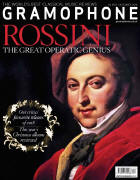Texte paru dans: / Appeared in: |
|
|
Outil de traduction (Très approximatif) |
|
|
Reviewer:
Alexandra Coghlan If you like your Baroque opera understated or postmodern (or uncut) then Fabio Ceresa’s Orlando furioso is not for you. Taking Vivaldi’s opera absolutely at face value, the director delivers a production that’s a gorgeous sprawl of period sensation and spectacle, high on camp and low on concept. Filmed in summer 2017 at the Festival della Valle d’Itria in Martina Franca, this performance (trimmed down to a tidy two hours 45 minutes) plays out against the handsome facade of the town’s Palazzo Ducale – a space that offers plenty of room for the rampant imaginations of designers Massimo Checchetto and Giuseppe Palella to expand into. A subsequent run at La Fenice’s tiny Malibran Theatre reportedly confined and corralled the visuals, losing the excess that is absolutely the heart of this production. The striking stage pictures come thick and fast, from the opening tableau of Alcina, framed like Botticelli’s Venus in a giant gilded scallop shell and surrounded by exotic attendants – all feathered headdresses and strategically placed chiffon – to Medoro’s arrival on the enchanted island, a flurry of silk seas and an evocatively stormtossed boat. This, though, is later revealed as just a warm-up for Ruggiero’s entrance astride a giant white eagle. Oversize shadow puppets create the shades of hell and the Pythonesque giant from which Orlando must seize Merlin’s ashes. If the cast don’t quite equal the visuals for sensation, there’s still plenty to enjoy. Mezzo Lucia Cirillo is a suitably bewitching Alcina, all hot eyes and cool coloratura, suddenly ferocious in her final ‘Anderò, chiamerò dal profondo’. Luigi Schifano’s Ruggiero is the pick of the countertenors – tone focused but never pushed, his ‘Sol da te mio dolce amore’ a dreamy vocal dance with obbligato flute – while Konstantin Derri is a tidy, prettily sung Medoro. In this sea of alto voices Loriana Castellano’s Bradamante also stands out, her delivery crisp, her tone pleasantly grainy and full of character. What to say of Sonia Prina’s Orlando? Although still a strong stage presence, Prina’s voice is now a caricature of what it once was. Her coloratura suffers from extreme vowel modification, a lack of legato and aspirated consonants (‘Nel profondo cieco mondo’ is a particularly extreme example), all of which makes for a wild and over-exaggerated performance. She fares better in the mad scene, where her particular vocal tics serve dramatic effect, but this is still an awkward and unsatisfying performance. Diego Fasolis and I Barocchisti provide efficient accompaniment, greatly enhanced by the rhetorical flair and wit of Fasolis’s own continuo-playing. |
|




